EU accession to the ECHR ("46+1" Group)
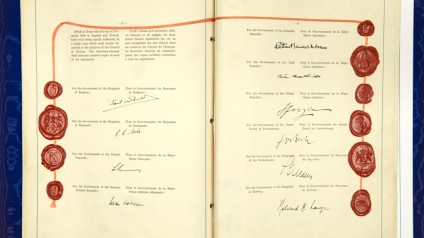
Accession of the European Union to the European Convention on Human Rights is a long-standing priority for the Council of Europe and a legal obligation for the EU. Following the entry into force of Protocol No. 14 to the ECHR and the Treaty of Lisbon, negotiations began in July 2010.
In June 2013, the CDDH noted with satisfaction the agreement at negotiators’ level on a comprehensive package of legal instruments setting out the modalities of accession of the European Union (EU) to the European Convention on Human Rights (ECHR). The Committee of Ministers took note of the CDDH’s interim report in September 2013. In December 2014, the Court of Justice of the EU (CJEU) delivered Opinion 2/13, in which it found that the draft accession agreement was not compatible with the relevant provisions of EU treaties.
In October 2019, the European Commission informed the Secretary General of the Council of Europe that the EU stood ready to resume the negotiations on its accession to the ECHR. In January 2020, the Ministers' Deputies approved the continuation of the ad hoc terms of reference of the Steering Committee for Human Rights (CDDH) to finalise as a matter of priority, in co-operation with the representatives of the European Union, in an ad hoc negotiation group “47+1” and on the basis of the work already conducted, the legal instruments setting out the modalities of accession of the EU to the ECHR, including its participation in the Convention system and, in this context, to examine any related issue. *
Following an online informal meeting in June 2020, the ad hoc negotiation group held a further 13 meetings between September 2020 and March 2023. At the final meeting, the group concluded its negotiations on all issues, with the exception of that concerning the CJEU’s jurisdiction over allegations of fundamental rights violations relating to acts or omissions under the EU’s common foreign and security policy. The EU stated its intention to resolve this issue internally and to inform the CDDH at appropriate intervals of developments.
At an extraordinary meeting in April 2023, the CDDH adopted its interim report to the Committee of Ministers, recording the provisional agreement at negotiators’ level on a revised package of accession instruments. In May 2024, the Committee of Ministers took note with satisfaction of the provisional agreement and the EU’s intention to resolve the outstanding issue internally.
* On 16 March 2022, the Committee of Ministers decided that the Russian Federation would cease to be a member of the Council of Europe forthwith. As a result, the Russian Federation no longer participated in the work of the CDDH or any of its subordinate bodies, including the ad hoc negotiation group on EU accession to the ECHR. Negotiations thereafter continued in a “46+1“ format.
Chairperson of the "46+1" Group
Ms Tonje Meinich
(Norway)
18th negotiation meeting (14-17 March 2023)
17th negotiation meeting (31 January-2 February 2023)
16th negotiation meeting (22-24 November 2022)
The CDDH ad hoc negotiation Group (“46+1”) on EU accession to the European Convention on Human Rights held its 16th meeting in Strasbourg from 22 to 24 November 2022.
The Group’s discussions focused mainly on the issue of voting in the Committee of Ministers when supervising the implementation of judgments of the European Court of Human Rights in cases to which the EU is a party. The Group examined various options for addressing this issue and identified areas for further exploration.
The Group will resume its discussion at its next meeting in January 2023.
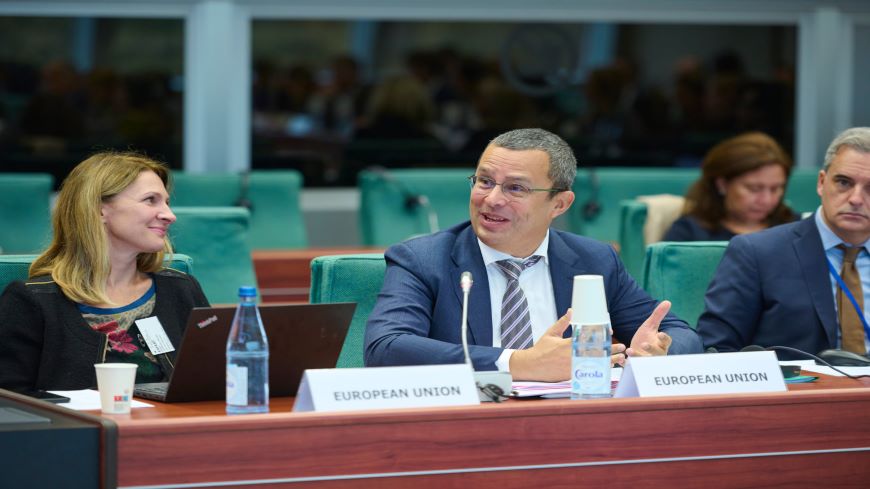
15th negotiation meeting (5-7 October 2022)
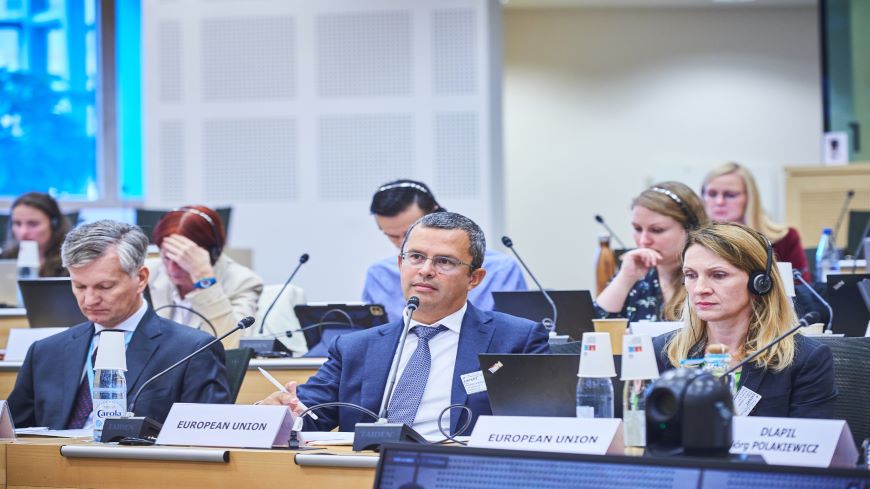
The CDDH ad hoc negotiation Group (“46+1”) on EU accession to the European Convention on Human Rights held its 15th meeting in a hybrid format, from 5 to 7 October 2022. The Group tentatively agreed on a proposal concerning requests for advisory opinions under Protocol no. 16 to the Convention. It also agreed to consider a new proposal concerning the election of judges to the European Court of Human Rights and continued its discussions on the issue of voting in the Committee of Ministers when supervising the implementation of the Court’s judgments by the EU, amongst other things. The next meeting is scheduled for 22-24 November 2022.
14th negotiation meeting (5-7 July 2022))
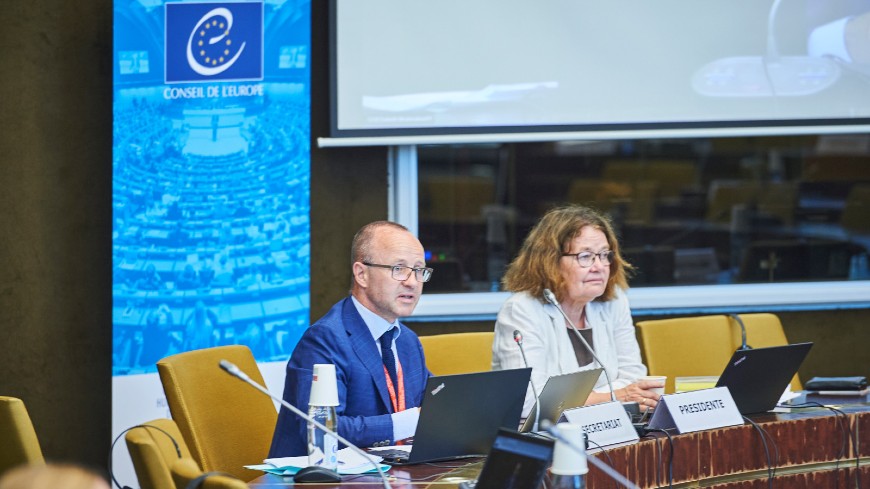
The CDDH ad hoc negotiation group (“46+1”) on EU accession to the European Convention on Human Rights held its 14th meeting on 5-7 July 2022 with the participation of almost 90 delegates. The main results of the meeting were a tentative agreement on the issue concerning inter-party applications under Article 33 of the ECHR, progress towards a possible solution to the issue concerning requests for advisory opinion under Protocol No. 16, and clarification of issues relating to voting in the Committee of Ministers when supervising the implementation of judgments of the European Court of Human Rights. The next meeting of the Group is foreseen for 4-7 October 2022.
13th negotiation meeting (10-13 May 2022)
The CDDH ad hoc negotiation group (“46+1”) on the EU accession to the European Convention on Human Rights held its 13th meeting on 10-13 May 2022. In total, more than 80 delegates participated in this meeting, which took place in hybrid format. During the meeting, the Group held an exchange of views with representatives of civil society on the issues and proposals currently under discussion. The Group will hold its next meeting on 5-7 July 2022.
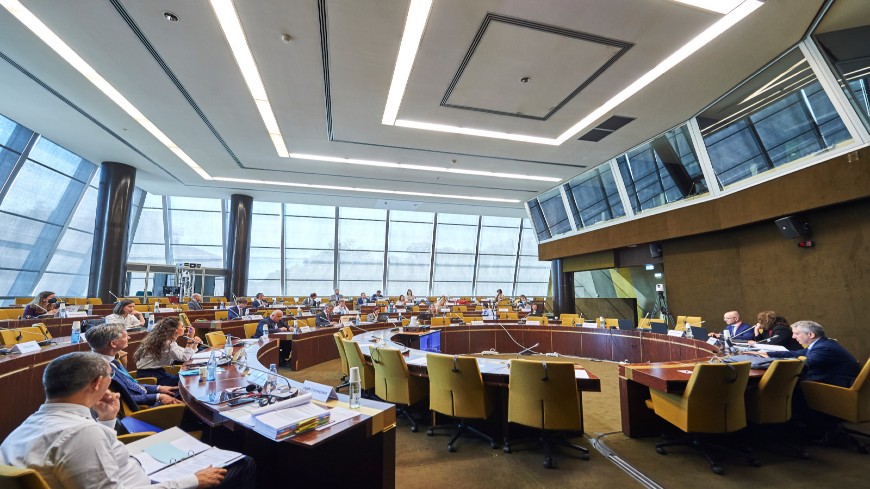
12th negotiation meeting (7-10 December 2021)
The CDDH ad hoc negotiation group (“47+1”) on EU accession to the European Convention on Human Rights held its 12th meeting from 7-10 December 2021. The meeting was held as a hybrid meeting (i.e. with delegates participating both in the meeting room and via video-conference). In total, more than 75 delegates participated. The Group discussed in particular proposals related to the EU’s specific mechanism of the procedure before the European Court of Human Rights, the principle of mutual trust between the EU member states, as well as the situation of EU acts in the area of the Common Foreign and Security Policy that are excluded from the jurisdiction of the Court of Justice of the European Union. The Group will hold its next meeting from 1-4 March 2022.
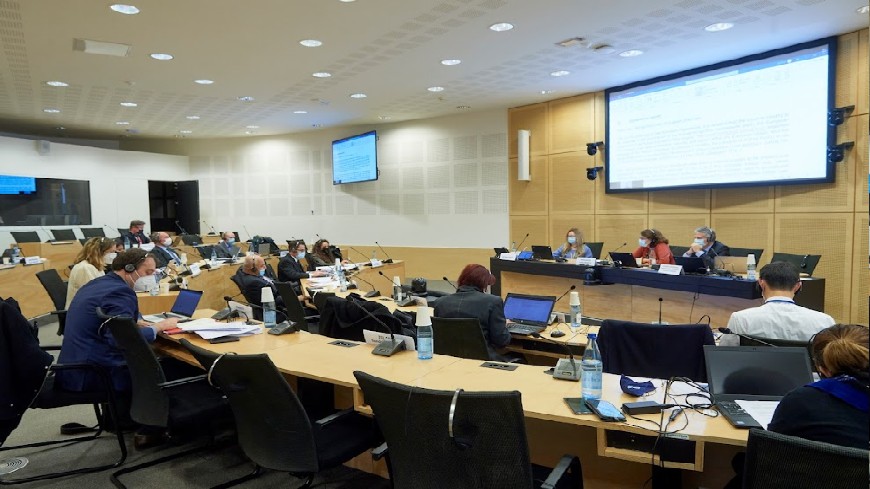
11th negotiation meeting (5-8 October 2021)
The CDDH ad hoc negotiation group (“47+1”) on EU accession to the European Convention on Human Rights held its 11th meeting from 5 – 8 October 2021. Due to the COVID-pandemic, the meeting was held as a hybrid meeting (i.e. with delegates participating both in the meeting room and via video-conference). In total, more than 70 delegates participated.
The Group discussed proposals related to the EU’s specific mechanism of the procedure before the European Court of Human Rights, the operation of inter-party applications (Article 33 of the Convention), the principle of mutual trust between EU member states and other provisions of the draft Accession Agreements (notably Articles 6-8). The Group will hold its next meeting from 7-10 December 2021.
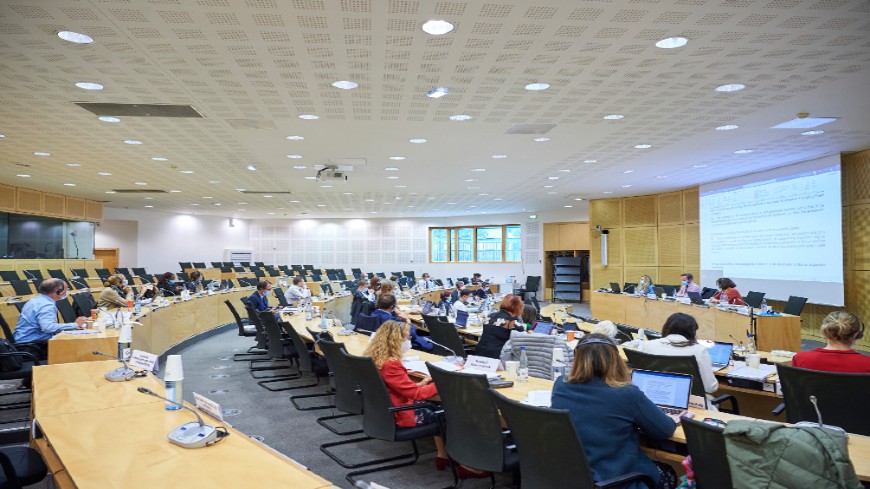
10th negotiation meeting (29 June-2 July 2021)
The CDDH ad hoc negotiation group (“47+1”) on EU accession to the European Convention on Human Rights held its 10th meeting from 29 June - 2 July 2021. Due to the COVID-pandemic, the meeting was held as a hybrid meeting (i.e. with delegates participating both in the meeting room and via video-conference). In total, more than 80 delegates participated. The Group discussed proposals related to the EU’s specific mechanism of the procedure before the European Court of Human Rights, the operation of inter-party applications (Article 33 of the Convention) and the principle of mutual trust between EU member states.
In the course of this meeting, the Group held another exchange of views with civil society (including representatives from the AIRE (Advice on Individual Rights in Europe) Centre, Amnesty International, the Council of Bars and Law Societies in Europe (CCBE), the International Commission of Jurists and the European Network of National Human Rights Institutions (ENNHRI)). The exchange of views focused in particular on the principle of mutual trust between the EU member states as well as the situation of EU acts in the area of the Common Foreign and Security Policy that are excluded from the jurisdiction of the Court of Justice of the European Union. The Group will hold its next meeting from 5-8 October 2021.
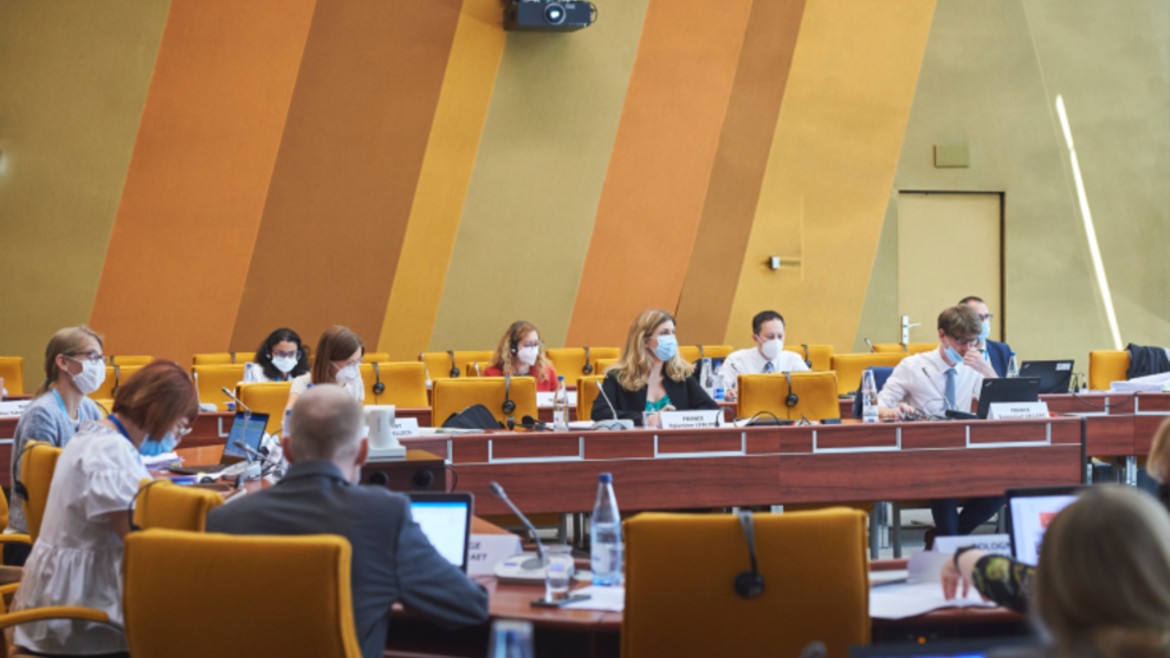
9th negotiation meeting (23-25 March 2021)
The CDDH ad hoc negotiation group (“47+1”) on EU accession to the European Convention on Human Rights held its 9th meeting from 23-25 March 2021 via videoconference. The Group discussed in particular proposals related to Article 53 of the Convention, the principle of mutual trust between the EU member states as well as the situation of EU acts in the area of the Common Foreign and Security Policy that are excluded from the jurisdiction of the Court of Justice of the European Union. In total, more than 108 delegates participated.
8th negotiation meeting (2-4 February 2021)
The CDDH ad hoc negotiation group (“47+1”) on EU accession to the European Convention on Human Rights held its 8th meeting from 2-4 February 2021 via videoconference. The Group discussed in particular proposals related to the EU’s specific mechanism of the procedure before the European Court of Human Rights, as well as the operation of inter-party applications (Article 33 of the Convention) and of requests for advisory opinions under Protocol No. 16 to the Convention. In total, more than 110 delegates participated.
7th negotiation meeting (24-26 November 2020)
The CDDH ad hoc negotiation group (“47+1”) on EU accession to the European Convention on Human Rights held its 7th meeting from 24-26 November 2020. In the course of this meeting, the Group held an exchange of views with civil society (including representatives from the AIRE (Advice on Individual Rights in Europe) Centre, Amnesty International, the Council of Bars and Law Societies in Europe (CCBE), the International Commission of Jurists and the European Network of National Human Rights Institutions (ENNHRI)). Due to the COVID-pandemic, the meeting was held as a videoconference. In total, more than 93 delegates participated.
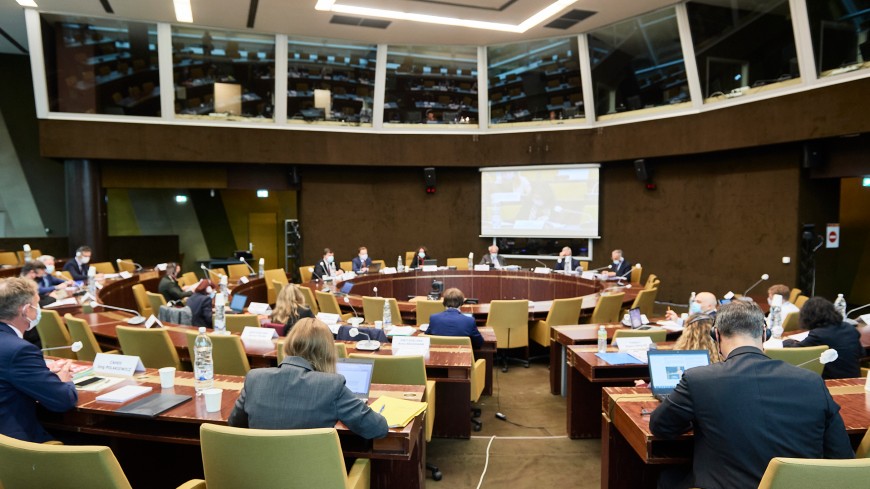
6th negotiation meeting (29 September-1 October 2020)
The CDDH ad hoc negotiation group (“47+1”) on EU accession to the European Convention on Human Rights held its 6th meeting from 29 September – 1 October 2020. Due to the COVID-pandemic, the meeting was held as a hybrid meeting (i.e. with delegates participating both in the meeting room and via video-conference). In total, more than 90 delegates participated. The present meeting was the first meeting of the Group since April 2013. The Group had reconvened following the request by the European Union to reopen the accession negotiations in October 2019 and the Committee of Ministers’ decision to provide the Group with new terms of reference in January 2020 to finalise the accession instruments. The Group had previously held an informal meeting in June 2020.
Virtual informal meeting (22 June 2020)
On 22 June 2020, the CDDH ad hoc negotiation group (“47+1 Group”) on the accession of the European Union (EU) to the European Convention on Human Rights (ECHR) held a virtual informal meeting with remote simultaneous interpretation. The meeting was organised and chaired by Ms Tonje Meinich (Norway), Chair of the “47+1 Group”. Mr Christos Giakoumopoulos (Director General Human Rights and Rule of Law) and Ambassador Meglena Kuneva (Head of the European Union Delegation to the Council of Europe) made opening addresses at the meeting. The Group also heard a presentation by the European Commission of its position paper on the accession of the EU to the ECHR, and held a general round of statements, comments or questions by delegations. Negotiations will formally continue with the 6th negotiation meeting of the “47+1 Group”.
Meeting reports of the first 5 meetings during the first negotiation cycle (2012-2013)
Formal and informal talks on the ways to achieve the accession of the EU to the ECHR had taken place within both organisations in the late 1970s, before the issue was brought to the forefront once again with the adoption of the European Union Charter of Fundamental Rights (7 December 2000).
With the entry into force of the Lisbon Treaty (1 December 2009) and of Protocol 14 to the ECHR (1 June 2010), the accession has no longer been merely a wish, it has become a legal obligation. However, some adjustments to the ECHR system are necessary in order to have the 48th High Contracting Party, which is a non-state entity with a specific and complex legal system.
The EU accession to the ECHR is one of the highest priorities of the Council of Europe and it constitutes a historical step for several reasons:
- As a result of acceding to the ECHR, the EU will be integrated into the fundamental rights protection system of the ECHR. In addition to the internal protection of these rights by the EU law and the Court of Justice, the EU will be bound to respect the ECHR and will be placed under the external control of the European Court of Human Rights.
- This will enhance consistency between the Strasbourg and the Luxembourg Courts and will afford citizens protection against the action of the EU, similar to that which they already enjoy against the action of Council of Europe member states.
- The accession will also enhance the credibility of the EU in the eyes of third countries, which the EU regularly calls upon, in its bilateral relations, to respect the ECHR.
In 2001, the Working Group GT-DH-EU was instructed to carry out a study of the legal and technical issues that would have to be addressed by the Council of Europe in the event of possible accession by the EU to the ECHR, as well as of the means to avoid any contradiction between the legal system of the EU and that of the ECHR.
On 4 June 2010, the EU Ministers of Justice gave the European Commission the mandate to conduct negotiations on their behalf. On 26 May 2010, the Committee of Ministers of the Council of Europe gave an ad-hoc mandate to its Steering Committee for Human Rights (CDDH) to elaborate, in co-operation with the European Commission, the necessary legal instrument for the accession. The CDDH entrusted the informal working group CDDH-UE with this task. It was composed of 14 experts from the Council of Europe member states (7 from EU member states and 7 from non-EU member states). The group held 8 meetings between July 2010 and June 2011.
On 14 October 2011, the CDDH transmitted a report to the Committee of Ministers on the work done by the CDDH-UE, and the draft legal instrument in appendix. Given the political implications and some of the issues that were raised, on 13 June 2012, the Committee of Ministers instructed the CDDH to pursue negotiations with the EU within the ad hoc group “47+1” and to finalise the legal instrument dealing with the accession modalities. The ad hoc group held 5 meetings in Strasbourg. The last meeting was held on 2-5 April 2013.
The negotiations resulted in agreement at negotiators’ level on a comprehensive package of legal instruments setting out the modalities of accession of the European Union to the European Convention on Human Rights (see Interim Report by the CDDH to the Committee of Ministers, CM(2013)93add1, 9 July 2013). On 18 December 2014, the Court of Justice of the European Union delivered its Opinion 2/13, concluding that the agreement on the accession of the European Union to the European Convention on Human Rights is not compatible with Article 6(2) of the Treaty on European Union or with Protocol (No 8) relating to Article 6(2) of the Treaty on European Union on the accession of the Union to the European Convention on Human Rights.


